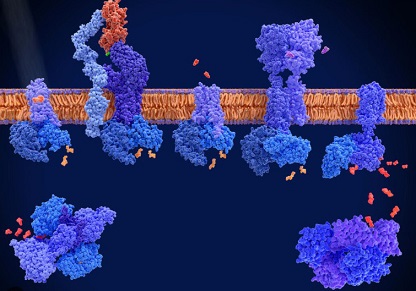Nikhil Prasad Fact checked by:Thailand Medical News Team Mar 12, 2024 1 year, 1 month, 6 days, 3 hours, 43 minutes ago
COVID-19 News: The rapid increase in knowledge regarding the impact of COVID-19 on the human body has shed light on the persistent symptoms experienced by some individuals, commonly known as Long COVID or Post-Acute Sequelae of SARS-CoV-2 infection (PASC). While the acute phase of COVID-19 primarily targets the respiratory system, the prolonged symptoms affecting multiple organ systems present a significant challenge for medical professionals and researchers. Recent studies have implicated the spike (S) protein of the SARS-CoV-2 virus in these prolonged symptoms, raising questions about its role in Long COVID. This article explores the complex interactions between G protein-coupled receptors (GPCRs), the spike protein, the Renin-Angiotensin System (RAS), and the brain, aiming to unravel the molecular mechanisms that may contribute to Long COVID pathophysiology. This
COVID-19 News report covers the role of G Protein-Coupled Receptor (GPCR) in Long COVID.
 G Protein-Coupled Receptor (GPCR) Plays A Role In Long COVID
Understanding Long COVID
G Protein-Coupled Receptor (GPCR) Plays A Role In Long COVID
Understanding Long COVID
Long COVID is a condition characterized by persistent symptoms in individuals who have recovered from acute COVID-19 infection. The symptoms can affect various organs and systems, including the respiratory, cardiovascular, neurological, and immune systems. The wide-ranging symptoms include fatigue, brain fog, shortness of breath, joint pain, and more, impacting the quality of life for those affected. The exact mechanisms behind Long COVID are not fully understood, and various hypotheses suggest residual viral particles, immune dysregulation, or autoimmunity may play a role. Recent studies propose a potential link between the spike protein of SARS-CoV-2 and the development of Long COVID, prompting further investigation into the molecular pathways involved.
G Proteins: Molecular Switches in Cellular Signaling
G proteins, or guanine nucleotide-binding proteins, act as molecular switches that play a crucial role in cellular signaling pathways. They exist in an inactive state when bound to guanosine diphosphate (GDP) and become activated by G protein-coupled receptors (GPCRs), leading to binding with guanosine triphosphate (GTP). G proteins are heterotrimeric, consisting of α, β, and γ subunits, and their activation triggers various intracellular signaling pathways. In the context of Long COVID, the focus on G proteins stems from their potential involvement in the complex molecular processes associated with persistent symptoms.
G Proteins in the Brain: Orchestrators of Neural Processes
The role of G proteins in the brain extends beyond simple cellular signaling, impacting neurotransmission, cognitive processes, memory formation, and mood regulation. The intricate dance of G protein signaling is essential for orchestrating the symphony of neural processes that underpin cognition, behavior, and immune system regulation. Viruses, including SARS-CoV-2, exploit GPCRs as part of their entry mechanism into host cells, hijacking cellular signaling pathways crucial for various physiological functions, including immune responses
.
G Proteins and Neuropsychiatric Disorders: A Link to Long COVID?
Abnormalities in G protein signaling have been linked to a range of neurological and psychiatric disorders, including schizophrenia, depression, bipolar disorder, Parkinson's disease, and addiction. The complex relationship between G proteins and neuropsychiatric disorders provides insight into potential connections with Long COVID. Alterations in G protein functions can affect neurotransmission, ion channels, and other signaling molecules, contributing to impaired cognitive, motor, and emotional processes observed in these disorders.
The Intricate Relationship between G Proteins, RAS, Spike Protein, and the Brain in Long COVID
The interplay between G proteins, the RAS, the spike protein, and the brain unveils a complex network of interactions that may contribute to Long COVID pathophysiology. GPCRs mediate some of the effects of Angiotensin II (Ang II) in the brain, indicating a convergence of G protein and RAS pathways in neurophysiological processes. Dysregulation of these intertwined systems may be implicated in neurological conditions such as Alzheimer's disease and depression, emphasizing the need for further research to uncover the exact mechanisms involved.
The Role of the Spike Protein in Long COVID
The spike protein of SARS-CoV-2 is a key player in the virus's entry into host cells. Recent studies suggest that the spike protein may contribute to Long COVID through various mechanisms. Persistent infection with residual viral particles, including the spike protein, could trigger ongoing symptoms. Additionally, an autoimmune response triggered by the spike protein may contribute to Long COVID symptoms, where the immune system mistakenly targets the body's healthy tissues.
Autoimmune Responses and Long COVID
Evidence suggests that SARS-CoV-2 might trigger an autoimmune response in certain individuals. The molecular mimicry between viral proteins, including the spike protein, and host proteins could lead to autoimmune reactions, potentially explaining some persistent symptoms in Long COVID patients. Further research is needed to elucidate the relationship between the spike protein and autoimmune responses, providing a crucial step in identifying potential treatments for patients with autoimmune disorders triggered by the virus.
Conclusion
Understanding the molecular mechanisms behind Long COVID is a complex and evolving task. The involvement of G protein-coupled receptors, the spike protein, the Renin-Angiotensin System, and the brain adds layers of intricacy to the puzzle. The multifaceted effects of COVID-19 on various organ systems, including the nervous system, necessitate a comprehensive approach to unraveling the mysteries of Long COVID. As research progresses, the potential for targeted interventions leveraging knowledge of these interconnected systems grows, offering hope for better diagnostic and therapeutic strategies for individuals grappling with Long COVID.
The study findings were published on a preprint server and are currently being peer reviewed.
https://www.preprints.org/manuscript/202403.0572/v1
For the latest on
COVID-19 News, keep on logging to Thailand Medical News.
Read Also:
https://www.thailandmedical.news/news/breaking-covid-19-news-sars-cov-2-cardiovascular-complications-are-due-to-generated-autoantibodies-targeting-g-protein-coupled-receptors
